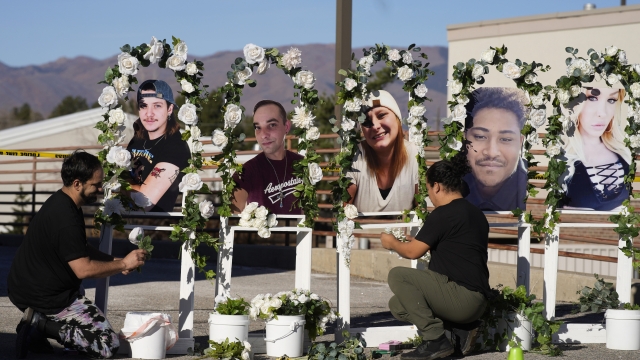Survivors of a mass shooting at an LGBTQ+ club in Colorado Springs are planning to sue the El Paso County Sheriff’s Office, claiming the law enforcement agency failed to trigger Colorado’s red flag law that would have allowed authorities to seize the suspect’s weapons before the November 2022 shooting. The suspect called an incident the year prior a prelude to becoming “the next mass killer” in America.
The notices of claim were filed in mid-May on behalf of James Slaugh, Tiffany Loving, Ashtin and Ryan Gamblin, JanCarlos Del Valle, Adriana Vance, Charlene Slaugh, John Arcediano, and Anthony Malburg and Jeremy Gold.
The victims are seeking $20 million in damages each, according to the documents.
An additional notice of claim seeks $424,000 on behalf of Barrett Hudson, another one of the victims in the shooting.
The attack at Club Q left five people dead and more than a dozen others injured.
The notices of claim cite an incident on June 18, 2021, that resulted in the arrest of Anderson Lee Aldrich — the 23-year-old suspect who identifies as nonbinary and who uses they/them pronouns — after they reportedly made bomb and weapons threats against their mother, resulting in an hourslong standoff that ended with the suspect surrendering to El Paso County deputies. Charges of felony menacing and first-degree kidnapping were never filed in that case due to lack of cooperation from witnesses, according to 4th Judicial District Attorney Michael J. Allen.
The case was dismissed just four months before the deadly shooting at Club Q.
SEE MORE: Colorado enacts 4 new gun control measures
“Despite the dismissal of criminal charges and sealing of the records, the Sheriff’s Office could nonetheless have filed an Extreme Risk Protection Order (ERPO) due to Aldrich’s violent conduct indicating that he posed a significant risk of causing personal injury to himself or others by having firearms in his control or by purchasing or possessing a firearm," the documents state. "The County's Resolution and the Sheriff's policy regarding Extreme Risk Protection Orders... prevented reasonable actions that could have been taken under the law to prevent the murders, assaults, and crimes that took place on Nov. 19th, 2022."
Under Colorado’s Extreme Risk Protection Order law, a judge can order that a person’s firearms be confiscated if they are deemed a risk to themselves or others. The request has to come from either family members or law enforcement officers, and a judge can place a temporary order for up to two weeks on the person until it is decided at a hearing whether a full protection order is necessary. If approved, a full protection order is valid for up to a year.
Through their lawyers, the victims blamed the sheriff’s office for “negligently and unconscionably” playing a role in the events of the deadly massacre by not preventing the suspect from possessing or using firearms following their arrest in 2021.
But in December of last year, the sheriff’s office said in a statement that filing an extreme risk protection order was not necessary because a mandatory protection order (MPO) was already in place at the time, according to CPR News.That order, just like an ERPO, bans people from possessing guns. Once the case was dismissed, however, the MPO was also lifted, which allowed the suspect to once again buy and possess guns, the sheriff’s office said.
SEE MORE: 'Active shooter' casualties hit 5-year high in 2022, FBI says
El Paso County has been particularly hostile to the state’s Extreme Risk Protection Order law. Before it became law in 2019, the county was among 2,000 others across the nation that declared themselves “Second Amendment Sanctuaries,” even passing a resolution that year specifically denying funds or staff to enforce the law.
Former El Paso County Sheriff Bill Elder had previously said he would only remove guns on orders from family members, refusing to go to court himself to get permission except under “exigent circumstances.”
“We’re not going to be taking personal property away from people without due process,” Elder said as the law neared passage in 2019.
The county, with a population of 730,000, had 13 temporary firearm removals through the end of last year, four of which turned into longer ones of at least six months, according to The Associated Press.
In response to the notices of claim, a spokesperson for the sheriff’s office said in a statement Monday they do not comment on pending litigation.
The suspect in the Club Q shooting is facing more than 300 charges, including first-degree murder, assault and bias-motivated crimes.
An arraignment is scheduled for June 26.
This story was originally published by Óscar Contreras for Scripps News Denver.
Trending stories at Scrippsnews.com



